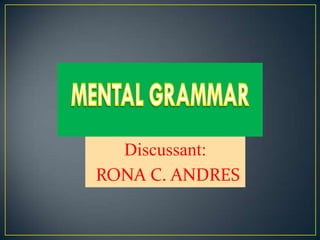
Mental grammar
- 2. The generative grammar stored in the brain that allows a speaker to produce language that other speakers can understand. The rules and principles that govern a language are almost all acquired in childhood; they are all “in the heads of native speakers” This grammar cannot be observed, what can be observed is the output of this mental process.
- 3. Also known as: COMPETENCE GRAMMAR LINGUISTIC COMPETENCE What is DESCRIPTIVE GRAMMAR?
- 4. • Definition Grammatical competence is the ability to recognize and produce the distinctive grammatical structures of a language and to use them effectively in communication. • Discussion Grammatical competence as defined by Noam Chomsky would include phonological competence. • Examples Learners of French need to learn to understand the different time references of sets of words such as je partais, je parte, je parterai, and to be able to make appropriate time reference when speaking or writing.
- 5. Linguistic Competence The unconscious knowledge of grammar that allows a speaker to use and understand a language. As used by Noam Chomsky and other linguists, linguistic competence is not an evaluative term. Rather, it refers to the innate linguistic knowledge that allows a person to match sounds and meanings
- 6. Examples and Observations: "Linguistic competence constitutes knowledge of language, but that knowledge is tacit, implicit. This means that people do not have conscious access to the principles and rules that govern the combination of sounds, words, and sentences; however, they do recognize when those rules and principles have been violated. .
- 7. DESCRIPTIVE GRAMMAR A descriptive grammar is a set of rules about language based on how it is actually used. In a descriptive grammar there is no right or wrong language. A descriptive grammar looks at the way a language is actually used by its speakers and then attempts to analyze it and formulate rules about the structure. Descriptive grammar does not deal with what is good or bad language use; forms and structures that might not be used by speakers of Standard English would be regarded as valid and included.
- 8. What linguists mean: Descriptive grammar What people actually say (Linguistic performance) Mental grammar What people know when they know a language (Linguistic competence)
- 9. Performance vs. Competence •Descriptive grammar: what people actually say –“Linguistic performance” •Mental grammar: what we guess people are capable of saying given unlimited memory, time, and energy –“Linguistic competence” •Examples: –Jane said that Tom told her that Susan said that…. –great great great great great... grandmother
- 10. Also, people make mistakes! Just because something comes out of someone’s mouth (descriptive grammar) doesn’t mean that that is part of their mental grammar •What linguists are actually interested in is mental grammar, but descriptive grammar is a necessary stepping stone in getting there .
- 12. Words are indispensable units. They come in a variety of sorts (word classes, word categories, parts of speech) such as nouns (table), verbs (walk), adjectives (beautiful), prepositions (in), articles (the), pronouns (he), conjunctions (and), and so on. Apart from having a word category label (noun, verb, etc.), they also have a form (made of speech sounds) and a meaning (made of concepts): Meaning word Form Word Category Label
- 13. Simplex and Complex Words All languages have affixes that can be attached to free morphemes (i.e., simplex words) to form new words that will thus be complex. Affixes Prefixes Suffixes un- -less non- -ly over- -hood re- -ate Another way to form new words is to simply combine two free morphemes: arm chair, kitchen table, iPod charger, etc. Such complex words have a special name; they are called compounds. In fact, we also have a word for word formation that uses affixes: derivation.
- 14. The study of the constraints on word formation is called morphology, which is also the name for the sub module of the mental grammar that contains these constraints. The constraints on complex words that regard the combinability of the category labels are either called morphology constraints or categorical constraints.
- 15. Open and closed word classes The morphology points to an interesting and presumably deep difference between two kinds of word classes. The morphological means allow us to make new nouns, verbs, adjectives, and adverbs, but not articles, prepositions, pronouns, conjunctions, and so on. Accordingly, we call the verbs group open classes, and the latter group closed classes. Closed classes are also called functional categories because whereas nouns, verbs, etc., have clear meanings, these closed class words are more functional. Sentences Combination of words (rather than morphemes, although simplex words are, by definition also single morphemes) and we form phrases which, in turn, make up sentences. What is Recursion? Inflection?
- 16. A Model of the Mental Grammar Lexicon Primitives Primitives Primitives & Constraints & Constraints & Constraints & Adjustments & Adjustments Semantic structure Syntactic structure Phonological structure linguistic expression Thought stuff Sound stuff
- 17. THANK YOU!!!
